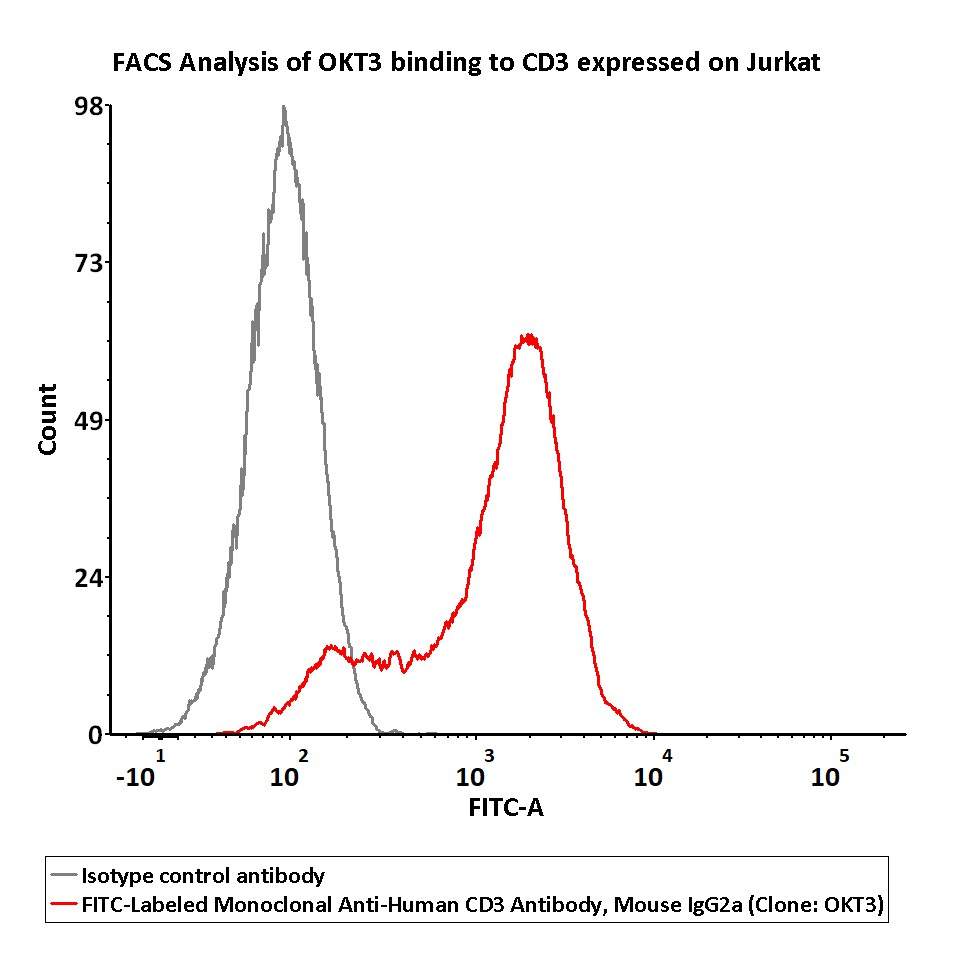抗体来源(Source)
Monoclonal Anti-Human CD3 Antibody, Mouse IgG2a (Clone: OKT3) is a monoclonal antibody recombinantly expressed from human 293 cells (HEK293), which provides higher batch consistency and long term security of supply.
应用(Application)
Flow Cytometry (Detection the expression of CD3 on Human cells).
克隆号(Clone)
OKT3
种属(Species)
Mouse
亚型(Isotype)
Mouse IgG2a | Mouse Kappa
特异性(Specificity)
This product is a specific antibody specifically reacts with CD3 epsilon protein.
种属反应性(Reactivity)
Human
免疫原(Immunogen)
Purified Human CD3ε Protein.
偶联(Conjugate)
FITC
Excitation source: 488 nm spectral line, argon-ion laser
Excitation Wavelength: 488 nm
Emission Wavelength: 535 nm
同型对照(Isotype Control)
The Isotype control is sold separately and you can search for Cat. No. DNP-FM487 for product information.
推荐稀释比(Recommended Dilution)
1:50
制剂(Formulation)
Lyophilized from 0.22 μm filtered solution in PBS, 0.03% Proclin 300, pH7.4 with trehalose as protectant.
Contact us for customized product form or formulation.
重构方法(Reconstitution)
Please see Certificate of Analysis for specific instructions.
For best performance, we strongly recommend you to follow the reconstitution protocol provided in the CoA.
存储(Storage)
For long term storage, the product should be stored at lyophilized state at -20°C or lower.
Please protect from light and avoid repeated freeze-thaw cycles.
This product is stable after storage at:
- -20°C to -70°C for 12 months in lyophilized state;
- -70°C for 12 months after reconstitution.
- 2-8 °C for 12 months after reconstitution.
活性(Bioactivity)-FACS

Flow cytometric analysis of Jurkat cells staining with FITC-Labeled Monoclonal Anti-Human CD3 Antibody, Mouse IgG2a (Clone: OKT3) (Cat. No. CDE-F15dP1) at 1:50 dilution (2 μL of the antibody stock solution corresponds to labeling of 1e6 cells in a final volume of 100 µL), compared with Isotype control antibody. FITC signal was used to evaluate the binding activity (QC tested).
Protocol
背景(Background)
CD3e molecule, epsilon is also known as CD3E, is a T-cell surface single-pass type I membrane glycoprotein. CD3E contains 1 Ig-like (immunoglobulin-like) domain and 1 ITAM domain. CD3E, together with CD3-gamma, CD3-delta and CD3-zeta, and the T-cell receptor alpha/beta and gamma/delta heterodimers, forms the T cell receptor-CD3 complex. This complex plays an important role in coupling antigen recognition to several intracellular signal-transduction pathways. The genes encoding the epsilon, gamma and delta polypeptides are located in the same cluster on chromosome 11. The epsilon polypeptide plays an essential role in T-cell development. CD3E plays an essential role in T-cell development, and defects in CD3E gene cause severe immunodeficiency. CD3E gene has also been linked to a susceptibility to type I diabetes in women. CD3E has been shown to interact with TOP2B, CD3EAP and NCK2.























































 膜杰作
膜杰作 Star Staining
Star Staining












